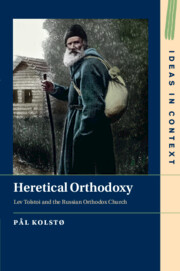Book contents
- Heretical Orthodoxy
- Ideas in Context
- Heretical Orthodoxy
- Copyright page
- Contents
- Preface
- Chapter 1 Introduction
- Chapter 2 Tolstoi as a Practicing Orthodox
- Chapter 3 Tolstoi’s Examination of Dogmatic Theology
- Chapter 4 Tolstoi, Orthodoxy and Asceticism
- Chapter 5 Lev Tolstoi and Orthodox Forms of Spirituality: Elders
- Chapter 6 Tolstoi and the Wanderer Tradition in Russian Culture
- Chapter 7 Tolstoi and the Ideal of “the Holy Fool”
- Chapter 8 Father Sergius: Kasatskii’s Spiritual Journey to Holy Foolishness
- Chapter 9 Tolstoi and the Social Ideal of the Eastern Church: John Chrysostom
- Chapter 10 The Church Mounts a Counterattack: Threat Perceptions and Combat Strategies
- Chapter 11 Between “Almost Orthodox” and “Antichrist”: Images of Lev Tolstoi in Russian Orthodox Polemics
- Chapter 12 The “Excommunication” and Its Aftermath
- Chapter 13 A Requiem for a Heretic? The Controversy over Lev Tolstoi’s Burial
- Chapter 14 Summary and Conclusions
- Bibliography
- Index
Chapter 14 - Summary and Conclusions
Published online by Cambridge University Press: 15 September 2022
- Heretical Orthodoxy
- Ideas in Context
- Heretical Orthodoxy
- Copyright page
- Contents
- Preface
- Chapter 1 Introduction
- Chapter 2 Tolstoi as a Practicing Orthodox
- Chapter 3 Tolstoi’s Examination of Dogmatic Theology
- Chapter 4 Tolstoi, Orthodoxy and Asceticism
- Chapter 5 Lev Tolstoi and Orthodox Forms of Spirituality: Elders
- Chapter 6 Tolstoi and the Wanderer Tradition in Russian Culture
- Chapter 7 Tolstoi and the Ideal of “the Holy Fool”
- Chapter 8 Father Sergius: Kasatskii’s Spiritual Journey to Holy Foolishness
- Chapter 9 Tolstoi and the Social Ideal of the Eastern Church: John Chrysostom
- Chapter 10 The Church Mounts a Counterattack: Threat Perceptions and Combat Strategies
- Chapter 11 Between “Almost Orthodox” and “Antichrist”: Images of Lev Tolstoi in Russian Orthodox Polemics
- Chapter 12 The “Excommunication” and Its Aftermath
- Chapter 13 A Requiem for a Heretic? The Controversy over Lev Tolstoi’s Burial
- Chapter 14 Summary and Conclusions
- Bibliography
- Index
Summary
This final chapter draws together the various strands in my research, and links up to the explanatory matrixes introduced in Chapter 1. I show how the ambiguity towards the Russian Orthodoxy that runs like a red thread throughout Tolstoi’s life and work is mirrored in equally strong ambiguity towards Tolstoianism and its originator in the assessments of various Orthodox authors. For instance, in their anti-Tolstoian pamphlets they complained that he had “rediscovered a long-discovered America”; that he had come as “a wolf in sheep’s clothing”; had “hidden behind a mask of goodness”; had “stolen the pearl of the Gospels,” and so on. In fact, all these laments and accusations implied that there was significant coincidence between Tolstoi’s teaching and Orthodox doctrine and religiosity. That is not to say that Tolstoi was an Orthodox in spite of himself. From a theological-dogmatic point of view, Tolstoi was undoubtedly a heretic. However, that term has no relevance for an inquiry into the history of ideas. My task here has been to move beyond such labels, looking for ideational and historical connections behind all the hostility and mutual recriminations between Russian Orthodoxy and Tolstoi’s heterodoxy. All this, my study has documented in full.
Keywords
- Type
- Chapter
- Information
- Heretical OrthodoxyLev Tolstoi and the Russian Orthodox Church, pp. 265 - 277Publisher: Cambridge University PressPrint publication year: 2022

